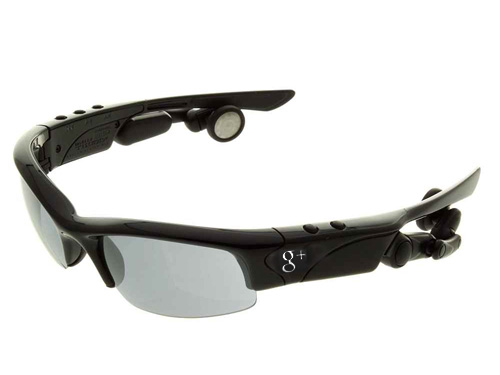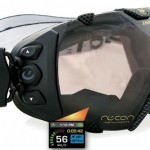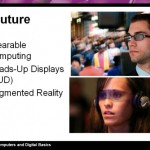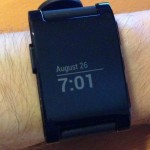Few weeks ago I have reported that we are skipping Halting State and going into Rainbow’s End mode with Augmented Reality contacts becoming commercially available around 2014. It turns out that the good folks at Google decided jumping ahead of the schedule like that is unhealthy, and so they decided to implement Halting State technology long before 2014.
According to fairly reliable sources, Google pans to start selling Augmented Reality Android glasses later this year.
Guys, I don’t think you heard me. I said:
Augmented… Reality… Fucking… Glasses!
This year!
I don’t know about you, but for me this is a dream come true. I always wanted to have a HUD. When I was a kid, I would walk around pretending to have a military grade head’s up display that notified me about diagnostic state of my hidden cyborg weapons and locked onto potential targets on the street. And later this year I might be actually able to buy internet enabled glasses that will make this a reality.
The Scientific American article I linked earlier was exciting, but it talked about new technology that may or may not become a commercial reality. But here we have Google, developing technology that it is determined to bring to the market. This is something that is happening, and I couldn’t be more excited. The question is whether or not this will catch on. Are we ready for AR glasses?
I mean, I know I am. I was born ready. But is the average consumer ready and willing to invest in such a gadget. Or will it be viewed mostly as a gimmick. Would you buy one? How much would you be willing to pay for it?
Question number two is whether Google can actually market these things. Google is great at distributing software and services, but they don’t necessarily have a great track record when it comes to hardware devices. The original Google Nexus phone was a really good device but suffered from the lack of availability on the major carriers that were reluctant to ship it. Because of that, sales suffered and it was discontinued. Let’s hope they can do better for these magical glasses.
Question number 3 is whether or not the app writers will embrace this device. The glasses will be useless if there is little to no software that exploits it. We don’t want these glasses to be the next Wiimote – a gimmicky device that few developers know how to use well, and mostly include a simple shake action as an afterthought. Instead we want to see an explosion of free AR software that will make these glasses indispensable.
Lastly, it will be interesting to see if Apple takes the bait and makes their own glasses to implement the iPhone. They could play it either way. If they choose to ignore the glasses they may potentially put a damper on the AR market. A lot of developers may become discouraged from developing AR apps for Android knowing that they would never be able to create ports for the more profitable Apple App Store. On the other hand, proliferation of AR software may be a kick in the groin that finally knocks Apple from it’s dominant position as the mobile market leader. If they don’t jump on it, they might give Google a dangerous advantage. Especially if Microsoft makes their own glasses for the Windows Phone – and they are so desperate to carve even the tiniest sliver of the mobile market for themselves, that they might actually do it.
If Apple comes out with their own glasses then the world may change forever. If both relevant mobile platforms have this technology, and are competitively trying to market and develop it, we might see it explode and completely revolutionize mobile computing.
We truly live in interesting times. I honestly can’t wait to get my hands on affordable, and functional AR glasses of some sort.






Seriously I don’t care if google becomes evil and starts tracking everything I do while wearing those glasses as long as I can have a health bar.
@ Liudvikas:
Yesss! Privacy is secondary to health bars!
These things would be pretty sweet.
But how would you actually use them?
I – Augmented Reality
These days augmented reality is actually pretty lame.
Yeah, you can “see” (either by projection of via an overlay on a picture taken by a camera) the world around you with mixed with virtual stuff.
But that stuff is not actually useful: a game is “projected” onto an empty table, little animated animals do their moves on an empty palm – Nothing too fancy.
The biggest use case would probably be to look at the sky and see the current time and weather…
What these things need is a camera and _good_ software to actually _recognize_ the things around you. And yes, google has the software, and yes, google has probably the raw data of a trillion objects contours in its databases – but how to get it to the user.
In AR there is no time to transmit an image to a server, get the object recognized and send a description back – in that time i have already moved my head away.
And doing it _locally_ is not doable. CPU power of mobile devices is good – but not that good. And the database needs to be stored somewhere… where it can be accessed _quickly_.
Which brings us to
II – The device
Where is the battery – if this thing has an AMOLED of the size of my thumb, the energy footprint will be pretty low – yet for a whole workday, there has to be some power – especially if wireless technologies are used and “apps” are run, etc.
And – here’s the biggest bummer:
It’s a screen! How do you interact with it?
Retina recognition is probably doable (fixed position relative to the eye, etc).
The standard paradigm today is touch – How to translate “touch” to “blink, focus and shake” (only 3 things I came up with that my eyes can do and still be recognizable)
Or will there be a wireless touchpad that you attach to your hips and navigate by scrolling around and a cursor[sic] would appear on screen?
Nobody can really think that voice recognition would be the _only_ input option…
And one _really_ annoying fact about AR is that the R (reality) is 3 dimensional.
AR would be bad if it only worked with flat surfaces before you.
How to translate interactions with distant objects into the UI paradigm.
You get it – i thing the device is absolutely realistic and doable – give or take 5 to 10 years. But the UI Design and usage paradigms will have to change much more dramatically.
Not from cursor to touch but to something else – something “more natural”(™)
—-
#Fanboy statement start
I believe that google will do this and will do it good.
But Apple will come 2 to 3 years later, will “reinvent” it (marketing slang) and will do a much better job than google. Because hey, – who’s best known for absolutely simple UI…
#Fanboy statement end
@ Daniel:
Some quick counterpoints:
I – we already have pretty good implementation of real time AR. I’m not sure if you have ever used the AR function of Yelp app, but it basically hangs overlay labels in the air in the direction of nearby restaurants. So you can walk around, panning left and right and see the food joints in your walking distance.
Google Googles on Android has a similar context aware app that puts location labels on nearby businesses and landmarks that integrade with Google’s places service.
Both of these cheat a bit – they use location services and compass to figure out where you are, and where the labels should be relative to which direction you are facing. They can fetch the data faster than you can walk so it works quite well.
Another application is bar and qr code scanning. There are countless apps that can do it right now – do price matching, online lookups, etc. But they are not convenient. Imagine having them in the glasses though. You pick up an item, you glance at the bar code and an overlay with nutrition data and pricing info opens up.
II – from what I read, the device will have accelerometers much like most modern phones. I assume that UI will likely be driven by mechanical head movement and potentially buttons on the frame. I’m actually quite ignorant on the state of eye tracking software so that may or may not be a viable option.
So yeah – good point. I’m not sure how will they resolve this. I can’t think of a good, intuitive and accurate UI that could be operated via head tilts and eye movements alone. I guess we’ll see how Google handles it once the prototypes become available to wider audiences.
Running Word Lens and a navigation software alone would make it a fantastic device for travelers.
As for input, I can see some kind of bracelet with buttons and/or touch surface. Besides your smartphone, of course.
@ IceBrain:
I completely forgot about WordLens. That’s another great example of an app that can do crazy AR processing in real time. Imagine walking around in foreign country and having a workable (though imperfect) translation for most signs, menus, etc.
As for possible UI – we can eventually go Rainbow’s End and have motion detection built into our clothes so you can launch macros by clenching your butt cheeks for example. :P
@ Luke Maciak:
I’m afraid to ask what kind of macro would be launched by clenching your butt cheeks. :D
Some suggestions for useful implementations:
1. Bracelet that monitors heart rate and constantly shows it on screen. Contacts 911 in case of emergency. Seriously, why don’t we have that yet?
2. Facial recognition, I suck at it, I’d love to have someone remind me the name of people that greet me. Google already has rather decent implementation of that in picasa. Why not have constant tracking of all the people you see? Let’s be evil!
3. Side and back as well as frontal cameras and implementations of radar like interface that detects all humans as well as other objects and estimates distance to them.
I’m not sure how to fit enough energy into that to have enough power to run it for a day.
Liudvikas wrote:
The find nearest public restroom macro I suppose. :P
Liudvikas wrote:
Me too. Isn’t it sad that machines are getting better at facial recognition than we are? I would like this overlay to pull up persons profiles on Facebook/Twitter (so I can connect them to their online identities) and have a big flashing “It’s this person’s birthday today” warning.
@ Luke Maciak:
Not really sad, machines will get better than us at everything, no way around it.
Anyway, perhaps it’s just a milder case of prosopagnosia or just me not being particularly interested in people, but the case is that I hardly recognize anyone I don’t meet often.
As for birthday notifications – excellent notion. I just wish it could exchange all the meaningless pleasantries also.
I’m simultaneously excited and annoyed. The reasons for excitement should be obvious to most of you; I’ve wanted something along these lines for a long time. But I’m also annoyed, as not a single one of the linked articles mentioned anything about whether these will be designed to be comfortable over “regular” glasses, or whether it will be possible to get them with a prescription. For many of us, this isn’t a matter of convenience; they would be completely useless to me if I had to give up the ability to see farther than two inches away from my face. :(
If, however, they are available in prescription… muah ha ha, I’ll wear them all the time.
@ Liudvikas:
Oh, no doubt that machines will eventually outperform us in everything. There is no shame in being beaten by turning grade automatons. But we are not there yet. We still have the edge: centuries of evolutionary adaptations as social animals, vs some buggy (let’s face it, there is no code that is not buggy out there – there are still patches for ed – the line editor every once in a while) neural network code some guy wrote in his 20% at Google.
@ StDoodle:
Hmm… Good point. It’s probably still to early to tell this kinds of details. They might still be at the prototype stage, trying to iron out the kinks out of the hardware they have. But yeah, this is a very good point. This is a new usability concern that we haven’t really encountered before.
I wouldn’t hold my breath for prescription lenses in the first gen device though. :(
Luke Maciak wrote:
Hey, I have custom-made pentagonal lenses, it’s about time I abused having two opticians in my immediate family again. :P
Technically I assume Facebook as well as Google could already provide facial recognition for that stuff…
These I would do. I’m more than ready for all your cyborg fantasies, I’m just more cautious an want modular external enhancements rather than implants or all-in-one devices. I’ve seen too much sci-fi and anime to trust my functions to a company who could shut parts down or jack up maintenance prices on me. I know they can already track me via my phone, but I can always leave that at home. Glasses are the perfect solution for semi-paranoid people like me.
Another thing to consider. Transitions style lenses.
@ StDoodle:
Nice. Sounds like you are set for life in terms of glasses. Fortunately I never had to wear any prescription lenses, and I’d prefer to keep it that way if I can help it. :)
@ Eric:
They could, and they would probably be halfway decent at it. Still, the technology is still quite young, and these things tend to work best if the subject stands still facing the camera.
@ Morghan:
Yeah. Or they will rise prices of Neuropazine, but you gonna pay them anyway cause you don’t want your augs rejected. And then you’re like:
“I never asked for this!”
Two words: Fuck yeah!
I, too, was born ready. Can’t wait for this. And assuming I can’t just install an add-on to my prescription glasses this’ll definitely make me scrap my no-contacts policy!
@ Kim Johnsson:
You may need to scrap that policy sometime soon anyway. :P
@ Luke Maciak:
Oh man, I love living in the future =D
I’m hoping that the near future will bring sub-corneal lasik + computer-adjustable dynamic prescription lens implants + HUD implantable lenses; now that’d be awesome!
Oh crap, forgot to add “;)” as the first is physically incompatible with the latter two, hence the joke. Sigh.
Pingback: The State of Wearable Technology | Terminally Incoherent
